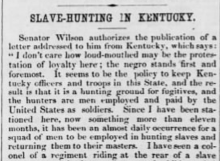SLAVE-HUNTING IN KENTUCKY.
Senator Wilson authorizes the publication of a letter addressed to him from Kentucky, which says: "I don't care how loud-mouthed may be the protestation of loyalty here; the negro stands first and foremost. It seems to be the policy to keep Kentucky officers and troops in this State, and the result is that it is a hunting ground for fugitives, and the hunters are men employed and paid by the United States as soldiers. Since i have been stationed here, now something more than eleven months, it has been an almost daily occurrence for a squad of men to be employed in hunting slaves and returning them tot heir masters. I have seen a colonel of a regiment riding at the rear of a slave gang composed of men, women and children, tied together, and guarded by men in uniform of United States soldiers. Let me give you an instance. Last Saturday, the commandant of this post gave an order to the provost marshal to seize and deliver outside of the lines, to her master, a slave girl who was employed as cook at the convalescent camp. This girl had been away from her master, who is and always has been a noted rebel, for more than six months. She ran away on account of his cruelty.
The owner of the girl, with the guard, went to camp, seized the girl, and, amid her cries and frantic appeals for protection, were taking her away. She fell upon her knees, and begged the guard to shoot her upon the spot, saying her master would whip her to death if he got her away. This was too much for the endurance of some of the inmates of the camp, and they interfered and took the girl away from the guard, dressed her in boy's clothes, and secreted her. In a few minutes an officer came with amounted [sic] patrol and exhibited an order from the commanding officer to search the camp for the girl, and return her to her owner. Thanks to the soldiers in the hospital, she was not to be found. It makes my blood boil to hear the high-sounding speeches and campaign orders published in the papers, and then witness these things daily." The writer then, speaking with loathing of the degradation of United States troops to the brutal business of whipping women, incloses to Senator Wilson this monstrous order:
HEADQUARTERS, CAMP NELSON, Ky.}
OFFICE POST COMMANDANT}
May 23, 1864.
LIEUTENANT:––Information has reached these headquarters that three of the women which you placed beyond the lines yesterday are back again in camp; and the colonel commanding directs that you send out your patrol and arrest them, and confine them in the military prison until they are all collected by themselves, when you will tie them up and give them a few lashes, and expel them beyond the lines the distance heretofore ordered. Also, any negro women here without authority will be arrested, and sent beyond the lines, and informed that, if they return, the lash awaits them.
By command of
Col. A.H. CLARK, Commanding Post.
Geo. A. HARRAFORD, Lieut. and Post Adjt.
To Lieut. John McQueen, Provost Marshal, Camp Nelson, Kentucky.
Adjt. Gen. Thomas will be in Kentucky next week, and two silver eagles will take an unusually high flight, and then the slaves of Kentucky will be gathered in by this great recruiter with a rake that will not leave a county unvisited. The epoch of pro-slavery bluster, border-state sneaking and military slave-driving is at an end. The negroes of Kentucky have got to fight for the Union. Gen. Thomas goes down with plenary powers, and carries in his pocket, to start the organization of three regiments, the names of qualified officers who have passed Casey's board. Sixteen regiments of Kentucky blacks will swell our ranks in a few weeks.
"Slave-Hunting in Kentucky," Boston (MA) Liberator, June 24, 1864

